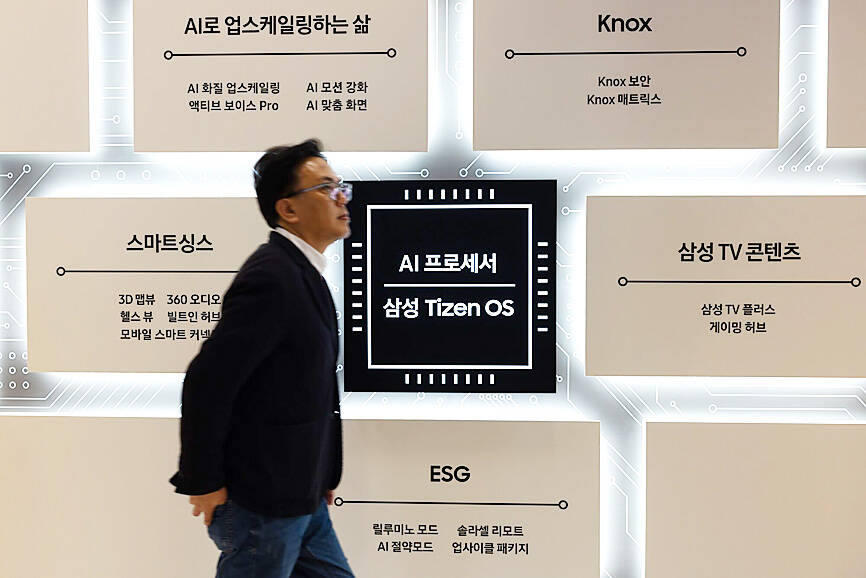The US plans to award more than US$6 billion to Samsung Electronics Co, helping the chipmaker expand beyond a project in Texas it has already announced, people familiar with the matter said.
The money from the 2022 CHIPS and Science Act would be one of several major awards that the US Department of Commerce is expected to announce in the coming weeks, including a grant of more than US$5 billion to Samsung’s rival, Taiwan Semiconductor Manufacturing Co (TSMC, 台積電), people familiar with the plans said.
The people spoke on condition of anonymity in advance of the official announcements.

Photo: Bloomberg
The federal funding for Samsung, South Korea’s leading chipmaker, would come alongside significant additional US investment by the firm, the sources said.
In 2021, the company announced a US$17 billion project in Taylor, Texas, near an existing plant in Austin. It is not yet clear where the additional investment would be located.
The pending announcement only represents a preliminary agreement that could still change, and no final decision has been made. Samsung and the US Department of Commerce declined to comment, while the White House did not respond to a request for comment.
The CHIPS Act set aside US$39 billion in direct grants — plus loans and loan guarantees valued at US$75 billion — to persuade the world’s top semiconductor companies to make chips on US soil after decades of production abroad.
The US Department of Commerce earlier announced three CHIPS Act grants to producers of older-generation semiconductors.
Officials have been negotiating for months with makers of cutting-edge chips that would fuel the artificial intelligence boom, and have set aside about US$28 billion for those advanced projects, US Secretary of Commerce Gina Raimondo has said.
Intel Corp — the main US competitor to Samsung and TSMC — has been in talks for a CHIPS Act package of more than US$10 billion spanning grants and loans. Intel’s incentive deal is expected to be announced next week, with the other advanced chipmakers set to follow, one of the people said.
It is not clear whether companies beyond Intel are in line to receive loans or financing guarantees. Samsung has indicated that it is not interested in loans, the sources said.
There is also the separate issue of US$3.5 billion in CHIPS Act grants for production of military chips — money that is expected to go to Intel and has thrown a wrench in negotiations over the past few weeks after the Pentagon pulled out from its portion of the funding.
Samsung previously said its Taylor site is slated to begin mass production this year, but that timeline is reportedly being delayed to next year. Company officials have since said that they cannot confirm the mass production schedule.
Samsung has touted its economic impact on the Austin region in Texas, which rose to US$26.8 billion last year from US$13.6 billion the year before, according to a third-party report the firm published last month.

Shiina Ito has had fewer Chinese customers at her Tokyo jewelry shop since Beijing issued a travel warning in the wake of a diplomatic spat, but she said she was not concerned. A souring of Tokyo-Beijing relations this month, following remarks by Japanese Prime Minister Sanae Takaichi about Taiwan, has fueled concerns about the impact on the ritzy boutiques, noodle joints and hotels where holidaymakers spend their cash. However, businesses in Tokyo largely shrugged off any anxiety. “Since there are fewer Chinese customers, it’s become a bit easier for Japanese shoppers to visit, so our sales haven’t really dropped,” Ito

The number of Taiwanese working in the US rose to a record high of 137,000 last year, driven largely by Taiwan Semiconductor Manufacturing Co’s (TSMC, 台積電) rapid overseas expansion, according to government data released yesterday. A total of 666,000 Taiwanese nationals were employed abroad last year, an increase of 45,000 from 2023 and the highest level since the COVID-19 pandemic, data from the Directorate-General of Budget, Accounting and Statistics (DGBAS) showed. Overseas employment had steadily increased between 2009 and 2019, peaking at 739,000, before plunging to 319,000 in 2021 amid US-China trade tensions, global supply chain shifts, reshoring by Taiwanese companies and

Taiwan Semiconductor Manufacturing Co (TSMC, 台積電) received about NT$147 billion (US$4.71 billion) in subsidies from the US, Japanese, German and Chinese governments over the past two years for its global expansion. Financial data compiled by the world’s largest contract chipmaker showed the company secured NT$4.77 billion in subsidies from the governments in the third quarter, bringing the total for the first three quarters of the year to about NT$71.9 billion. Along with the NT$75.16 billion in financial aid TSMC received last year, the chipmaker obtained NT$147 billion in subsidies in almost two years, the data showed. The subsidies received by its subsidiaries —

Taiwan Semiconductor Manufacturing Co (TSMC) Chairman C.C. Wei (魏哲家) and the company’s former chairman, Mark Liu (劉德音), both received the Robert N. Noyce Award -- the semiconductor industry’s highest honor -- in San Jose, California, on Thursday (local time). Speaking at the award event, Liu, who retired last year, expressed gratitude to his wife, his dissertation advisor at the University of California, Berkeley, his supervisors at AT&T Bell Laboratories -- where he worked on optical fiber communication systems before joining TSMC, TSMC partners, and industry colleagues. Liu said that working alongside TSMC